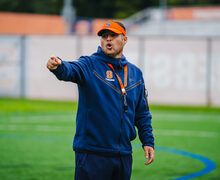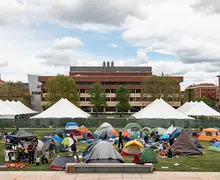Activists demonstrate against Citigroup
A 50-foot balloon propped in the middle of the quad at Syracuse University on Tuesday caught many students by surprise and prompted at least 50 to learn more about the rain forest and its destruction.
The balloon was brought to SU by the Rainforest Action Network, an environmental activism group based in San Francisco. Members of RAN are traveling around the country with the balloon and making stops at college campuses speaking out against Citigroup, one of the world’s largest financial institutions. RAN’s visit was sponsored by the Student Environmental Action Coalition.
RAN alleges that Citigroup supports efforts to destroy the world’s rainforest and other environmentally sound areas by lending money to companies that are active in extracting resources from the rainforest.
Jeff Black, a member of RAN who is touring with the balloon, told students that by using Citigroup credit cards and loans their money is contributing to the destruction.
‘This is our money that they’re using,’ he said.
Black said that because of the numerous financial options the company offers students, the company is seen as a ‘Trojan horse’ into student’s minds.
Mark Rodgers, a Citibank spokesman, said that the company denies RAN’s claims.
‘Citibank conducts its business in a morally, socially and environmentally responsible manner,’ Rodgers said. ‘We seek to maintain a constructive dialogue with a number of groups on relevant social and environmental ideas to enhance our progress toward what are often common goals.’
Citibank is a division of Citigroup.
Courtney Mason, a junior consumer studies major, saw the balloon in the quad as it was being deflated. She said she was skeptical about RAN’s claims, but admitted that just hearing them may make her look at Citigroup differently.
‘The only effect it would have on me is that if I ever opened a credit card in the future I might not open with them,’ Mason said. ‘Even if it weren’t true it’d probably be in the back of my mind and deter me from doing business with them.’
Members of RAN encouraged students to stand up against Citigroup by refusing to take out credit cards and loans with the company.
Students such as Mason are the ones Rodgers said will be swayed away from the company because of RAN’s methods of speaking out against Citigroup.
‘We object to the group’s tactics to portray Citigroup in a false manner and highly misleading and inaccurate way,’ Rodgers said.
Colin Grant, a senior environmental forest biology major at the State University of New York College of Environmental Science and Forestry said several cities, including Syracuse, have alternative credit unions that students can use for banking and credit card services.
‘Local places like the Syracuse Federal Credit Union invest all their money back into the community,’ Grant said. ‘Just by doing that students can boycott the destruction of the rainforest.’
Black was also enthusiastic about student use of credit unions, but earlier in the day conceded that he doesn’t expect everyone who uses Citigroup to stop doing so.
‘I’m not saying everyone wants to tear up their credit card,’ he said.
Kyla Hershey-Wilson, another member of RAN, said she thinks students’ actions can be more powerful than they might think.
‘This is the kind of campaign that many people agree with but do very little about,’ she said. ‘The trick is motivating them by speaking to them. After that you have them interested and working for the cause.’
She also said people should ‘start thinking of Citi as a global destroyer like we think of Nike and sweatshops.’
Mike Farrell, a graduate forestry student at SUNY ESF, said that while RAN needs to start their efforts somewhere, he doesn’t think focusing their efforts on Citigroup alone will do the job.
‘If you want to put an end to this you need to stop those who are doing it,’ he said. ‘Stopping Citigroup is just stopping one institute and if you want to make change you have to focus on all the groups.’
Published on March 19, 2002 at 12:00 pm




